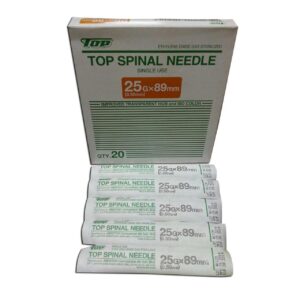SPINAL NEEDLE
SPINAL NEEDLE: Drug: SPINAL NEEDLE
Use: A spinal needle is a medical device used to administer medication, collect samples, or inject anesthesia into the spinal canal. It is commonly used in spinal anesthesia procedures, where it is inserted into the subarachnoid space of the spinal cord to deliver medication to block nerve impulses and provide pain relief during surgeries or medical procedures.
Mechanism of Action: The spinal needle works by puncturing the top layers of the spinal cord to reach the subarachnoid space. Once inserted, medications such as local anesthetics or opioids can be injected into the spinal canal, directly affecting the nerve roots and spinal cord to block pain signals.
Dose: The dose of medication administered through a spinal needle depends on the specific procedure and the patient’s individual requirements. It is determined by the healthcare professional performing the procedure, taking into account the patient’s weight, age, medical condition, and the desired level of anesthesia.
Side Effects: Although spinal anesthesia using a spinal needle is generally considered safe, there are potential side effects. These can include:
1. Headache: The most common side effect is a post-dural puncture headache, which occurs when there is a small leakage of cerebrospinal fluid (CSF) from the puncture site. It is usually temporary and resolves within a few days.
2. Nerve Damage: Rarely, the spinal needle can cause nerve damage or irritation, leading to neurological symptoms such as numbness, weakness, or pain.
3. Infection: Any invasive procedure carries a risk of infection. Proper sterile technique and precautions are necessary to minimize this risk.
4. Bleeding: There is a small risk of bleeding at the puncture site, especially in patients with a bleeding disorder or those taking blood-thinning medications.
5. Allergic Reactions: Some individuals may experience an allergic reaction to the medication injected through the spinal needle. It is important to inform the healthcare provider of any known allergies beforehand.
It is essential to have a trained healthcare professional perform the procedure to minimize the risks associated with the use of spinal needles. The specific side effects and risks may vary depending on the individual patient and their medical condition.


